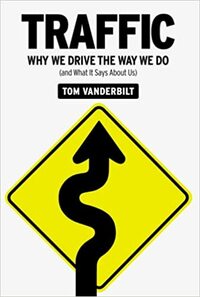You need to sign in or sign up before continuing.
Take a photo of a barcode or cover
The information in this book is really fascinating, but it's very dry. I'm not sure I'll be able to finish reading it because it's so dry. But I'm kind of a nerd for research like this, so maybe.
Loving this, but it is due back to the library (it was really Dale's read, and I glammed onto it). Will DEFINITELY complete this as it is simply fascinating.
Added: I forgot to mention in my first review that I love the cover of this book. The way the traffic sign is printed makes it reflective and I thought that was a great idea.
This is a very interesting book about engineering and psychology related to driving and roads. I liked it a lot.
I was going to try to list the parts I like best, but really I can't pick, it is all pretty good.
This is a very interesting book about engineering and psychology related to driving and roads. I liked it a lot.
I was going to try to list the parts I like best, but really I can't pick, it is all pretty good.
3.5 stars
This book took me two months to get through but I made it! Interesting, lots of studies. I didn't like the way the book was organized -- a bit disorganized. I found the discussion on risk homeostasis really fascinating though, which is the idea that we all accept a certain amount of risk while driving, and the safer the roads are, the more dangerous we drive (and vice versa).
This book took me two months to get through but I made it! Interesting, lots of studies. I didn't like the way the book was organized -- a bit disorganized. I found the discussion on risk homeostasis really fascinating though, which is the idea that we all accept a certain amount of risk while driving, and the safer the roads are, the more dangerous we drive (and vice versa).
Felt mixed about this book. I’d wanted to read it for a long time and was a bit disappointed. There weren’t as many concepts or statistics that blew my mind as I’d expected. There were a handful of really interesting tidbits, and it helped to have a reminder of the fundamentals of traffic that we never think about, but it really dragged for me. I didn’t look forward to listening to it.
This continues my several month stretch of finding it hard to get all the way through books. 😏
This continues my several month stretch of finding it hard to get all the way through books. 😏
"We are how we move. Like Goofy, I, too, suffer from this multiple personality disorder. When I walk, which as a New Yorker I often do, I view cars as loud, polluting annoyances driven by out-of-town drunks distracted by their cell phones. When I drive, I find that pedestrians are suddenly the menace, whacked-out iPod drones blithely meandering across the street without looking. When I ride a bike, I get the worst of both worlds, buffeted by speeding cars whose drivers resent my superior health and fuel economy, and hounded by oblivious pedestrians who seem to think it’s safe to cross against the light if “only a bike” is coming but are then startled and indignant as I whisk past at twenty-five miles per hour..."
2.5* Plenty of interesting stuff but didn't hold my attention and could drag at times
I still regularly quote findings from this book to people a decade after reading it. It made me a late merger!
In Traffic, Tom Vanderbilt aims to present the reader with some of the most surprising psychological findings about the phenomenon of driving. As a result, this book is incredibly informative, and reads quickly for the information density of the chapters. Stylistically, I did find it to be pretty mediocre pop-sci writing - for example, Vanderbilt has the tendency to digress to throw in random anecdotes or movie quotes where they occur to him, which didn't really add a lot for me. I also couldn't help but be disappointed in his overly quick treatment of the relation of traffic laws and traffic norms (I think this concluding sentence speaks for the level of sophistication: "Laws explain what we ought to do; norms explain what we actually do."), given that it is a topic I take pretty seriously. Overall, the book is definitely worthwhile for anyone who has ever been even a little curious about traffic patterns, why they exist, and whether they can be improved.
More fascinating and enlightening than it should be
I spend 2 hours of my weekdays in traffic. So, why not learn more about why it exists and functions? Because that sounds like the most boring thing anyone could ever do. But it's not. This book was a superbly fascinating, informative, insightful, and entertaining read. Seriously.
I spend 2 hours of my weekdays in traffic. So, why not learn more about why it exists and functions? Because that sounds like the most boring thing anyone could ever do. But it's not. This book was a superbly fascinating, informative, insightful, and entertaining read. Seriously.





